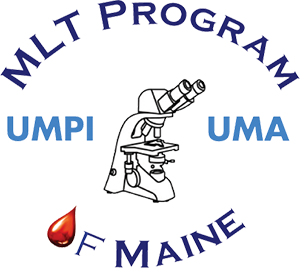- To provide students both academic instruction and professional training in the field of laboratory medicine to meet employment needs of communities in the State of Maine.
- Provide a climate conducive to further developing interest in MLT education by participation in professional organizations, and encouraging awareness in changing trends in medical laboratory technology.
- Produce graduates that will demonstrate the technical skill of an entry-level technician in an ethical and professional manner.
- To produce skilled clinical laboratory workers who:
- through general and technical education, are qualified to perform with minimal supervision, the tests routinely performed in clinical laboratories,
- are able to collect, label, identify, and log in specimens accurately,
- have a working knowledge of the principles of the tests they are performing,
- perform laboratory test procedures accurately and efficiently,
- keep accurate and legible records and are able to communicate reports clearly to fellow medical personnel,
- correlate laboratory test results with patient diagnosis and treatment,
- are skillful in the operation of laboratory instruments and are able to recognize instrument failures and take appropriate actions by problem solving and troubleshooting,
- perform quality assessment within the clinical laboratory; recognize interferences with pre-analytical, analytical, and post-analytical test factors and take appropriate actions,
- demonstrate knowledge of infection control and safety practices and follow established guidelines and regulations,
- demonstrate technical training sufficient to orient new employees within the clinical laboratory,
- will take responsibility for their own work and are able to organize their work to make the most efficient use of time,
- will adapt well to various work situations by cooperating with their coworkers and all members of the health care team,
- maintain the confidentiality of patient results,
- are able to perform efficiently under stress,
- will pursue certification and strive to keep their competence and knowledge current in relation to the changing work environment with continued professional development.
- To maintain accreditation of the program through the National Accrediting Agency for Clinical Laboratory Sciences (NAACLS).
- To produce graduates that will pass certification exams as a first time applicant at a 90% pass rate.
- To maintain high academic and professional standards both in the program and in its students.
- To maintain a quality program through continuous assessment, evaluation, and revision.
- To maintain qualified faculty that pursues life-long learning and continued professional development.
ENTRY LEVEL COMPETENCIES
At career entry, the Medical Laboratory Technician will be able to perform routine clinical laboratory testing in the departments of hematology, clinical chemistry, immunohematology, clinical microbiology, serology/immunology, coagulation, molecular, and other emerging diagnostics as the primary analyst making specimen oriented decisions on predetermined criteria, including a working knowledge of critical values. Communication skills will extend to frequent interactions with members of the healthcare team, external relations, customer service, and patient education. The Medical Laboratory Technician will have diverse functions in areas of pre-analytical, analytical, and post-analytical processes. The clinical Medical Laboratory Technician will have responsibilities for information processing, training, and quality control monitoring wherever clinical laboratory testing is performed.
Upon graduation and initial employment, the Medical Laboratory Technician should be able to demonstrate entry-level competencies in the areas of professional practice listed below:
- Collecting and processing biological specimens and other substances for analysis;
- Performing analytical tests on body fluids, cells, and other substances;
- Recognizing factors that affect procedures and results, and taking appropriate actions within predetermined limits when corrections are indicated;
- Performing and monitoring quality control within predetermined limits;
- Performing preventive and corrective maintenance of equipment and instruments or referring to appropriate source for repairs;
- Applying principles of safety;
- Demonstrating professional conduct and interpersonal communication skills with patients, laboratory personnel, other healthcare professionals, and with the public;
- Recognizing the responsibilities of other laboratory and healthcare personnel and interacting with them with respect for their jobs and patient care;
- Applying basic scientific principles in learning new techniques and procedures;
- Relating laboratory findings to common disease processes;
- Establishing and maintaining continuing education as a function of growth and maintenance of professional competence.
Reference: Essentials and Guidelines of Accredited Educational Programs for the Medical Laboratory Technician, National Accrediting Agency for Clinical Laboratory Sciences (NAACLS), revised 1995.

